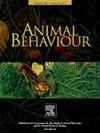Capuchin monkeys' responses to inequity in a group context
IF 2.3
2区 生物学
Q2 BEHAVIORAL SCIENCES
引用次数: 0
Abstract
Noticing how ones' outcomes compare to your partner’s can help you decide who to cooperate with, promoting cooperative relations that are beneficial for both. As such, understanding how animals respond to unequal outcomes is key to uncovering evolutionary roots of cooperation and fairness. Recent research has demonstrated that various animal species respond negatively when they receive less preferred rewards than a partner for completing the same task, often refusing the reward or withdrawing from the task. While most studies on inequity aversion focus on dyadic contexts, which ensure experimental control, these settings do not capture the complexity of natural social environments and may limit partner choice. In this study, we explored responses of brown capuchin monkeys, Sapajus [Cebus] apella, to inequity in a more naturalistic group context, extending their well-documented inequity aversion from dyadic contexts. We compared both food refusals and the number of trades in a token exchange task across various conditions (advantageous and disadvantageous inequity, contrast and equity) involving different combinations of food values. Considering refusals, as in dyadic studies, brown capuchin monkeys were sensitive to disadvantageous inequity, refusing low-value rewards when their partners received higher-value rewards, but rarely rejecting medium- or high-value food. Unexpectedly, we found a negative response to contrast and advantageous inequity, neither of which had been observed in previous studies. In contrast, the number of exchanges capuchins initiated was driven by food value, with no effect of what their partner received. We discuss various factors, such as group dynamics and constraints of the tasks that may explain differential responses in group versus dyadic contexts pointing to new research directions. This study highlights the importance of more naturalistic conditions to achieve a nuanced understanding of the impact of the social context on primate decision making.
卷尾猴在群体环境中对不平等的反应
注意自己的结果与你的伴侣的结果的比较可以帮助你决定与谁合作,促进对双方都有利的合作关系。因此,了解动物对不平等结果的反应是揭示合作与公平的进化根源的关键。最近的研究表明,许多动物在完成同样的任务时,如果得到的奖励比同伴少,它们的反应就会消极,通常会拒绝奖励或退出任务。虽然大多数关于不公平厌恶的研究都集中在确保实验控制的二元环境中,但这些环境并没有捕捉到自然社会环境的复杂性,可能会限制伴侣的选择。在这项研究中,我们探索了棕色卷尾猴(Sapajus [Cebus] apella)在一个更自然的群体环境中对不平等的反应,将它们在双源环境中对不平等的厌恶延伸到更自然的群体环境中。我们比较了在涉及不同食物价值组合的各种条件下(有利和不利的不平等、对比和公平),代币交换任务中的食物拒绝和交易数量。考虑到拒绝,在二元研究中,棕色卷尾猴对不利的不平等很敏感,当它们的伴侣得到高价值的奖励时,它们会拒绝低价值的奖励,但很少拒绝中等或高价值的食物。出乎意料的是,我们发现了对对比和有利不平等的负面反应,这在以前的研究中都没有观察到。相比之下,卷尾猴发起的交换次数是由食物价值驱动的,对它们的伙伴收到的东西没有影响。我们讨论了各种因素,如群体动力学和任务约束,这些因素可能解释群体与二元环境下的不同反应,并指出了新的研究方向。这项研究强调了更自然的条件对于实现对社会环境对灵长类动物决策影响的细致理解的重要性。
本文章由计算机程序翻译,如有差异,请以英文原文为准。
求助全文
约1分钟内获得全文
求助全文
来源期刊

Animal Behaviour
生物-动物学
CiteScore
4.60
自引率
8.00%
发文量
236
审稿时长
10.2 weeks
期刊介绍:
Growing interest in behavioural biology and the international reputation of Animal Behaviour prompted an expansion to monthly publication in 1989. Animal Behaviour continues to be the journal of choice for biologists, ethologists, psychologists, physiologists, and veterinarians with an interest in the subject.
 求助内容:
求助内容: 应助结果提醒方式:
应助结果提醒方式:


